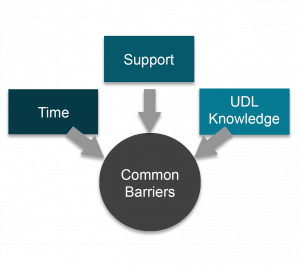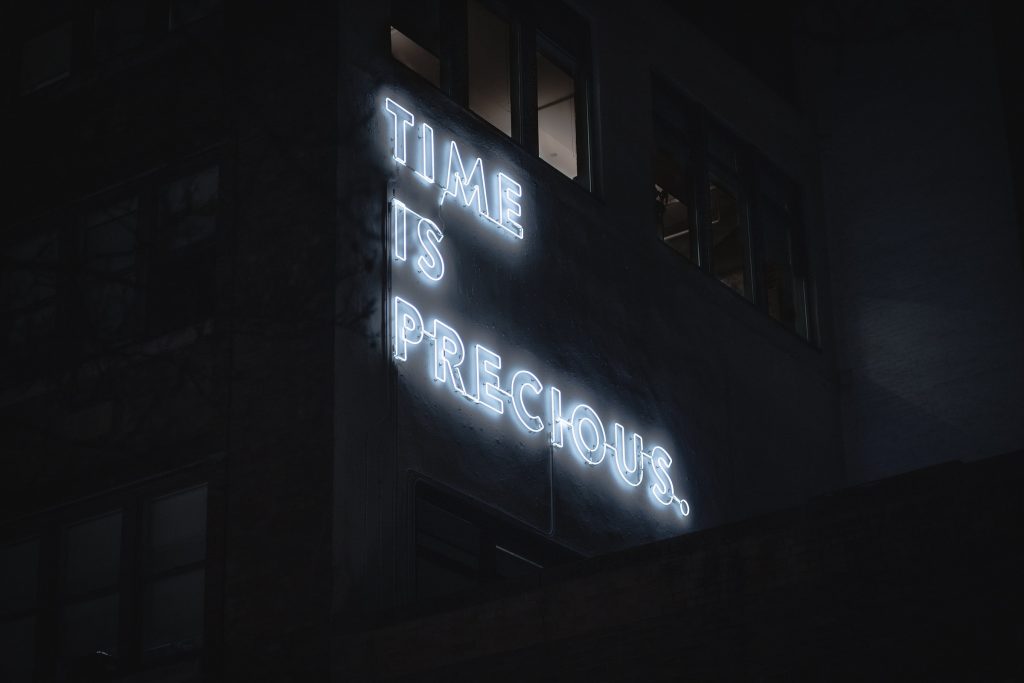2.4: Barriers to UDL Implementation
By this point, you have learned about the UDL Guidelines, principles, and implementation examples for each phase in the curriculum design, development, and delivery process. While UDL implementation can create a more inclusive, equitable and accessible learning environment for all learners, it is not without challenges. It is imperative to reflect on both learner and educator needs and proactively address possible barriers to your UDL implementation when you can. Some common barriers to UDL implementation in post-secondary education include time, support, UDL knowledge.


Time, or lack of it, can feel like a barrier for educators; our time to develop or redevelop curriculum or a course is already often tight. Educators who are early in their UDL implementation journey can sometimes feel that they do not have the time needed to write course navigation instructions, offer submission options for assessments, or make learning materials accessible and explicit. Alternatively, there could be external factors that impede the time for UDL implementation. For example, a course with limited time designated for marking may mean that an educator is unable to include more authentic assessment options or assignment submission options.
Solutions to the barrier of time are contextual; however, there are some ideas to consider. Firstly, UDL implementation should save educators’ time. For example, a course with clear assignment instructions or an explicit learning plan meaning less learner questions, thus saving the educator time.
Secondly, communication regarding time requirements for specific UDL interventions are beneficial. For example, discussions with post-secondary leadership can support changes to designated marking time, teaching support and/or additional resources to be able to embed UDL into a course or program.
Lastly, leveraging the technology available can support UDL implementation and save time. For example, if an institution’s learning management system has a built-in text-to-speech tool, content provided in HTML format or uploaded as a document allows learners to use the tool for additional content options to learners without significant additional time or effort on the part of the educator.
Time can be a barrier to UDL implementation, but not an insurmountable one.
Support

Support for UDL implementers in higher education in Ontario can feel scarce. There are a variety of reasons, including:
- Few examples of UDL in post-secondary education
- UDL resources and professional development opportunities are often expressly for elementary and secondary education
- Resources and/or supports from other countries can be difficult to apply to the Ontario, post-secondary context
However, UDL support does exist, just not always in the places educators might expect. Within post-secondary institutions, there are a wealth of talented and dedicated educators in a variety of fields and departments. While you may not have a specific UDL support role, it is likely that there are support persons for UDL implementation throughout the institution. Select each support listed below to learn more about each one.
Creating a list of UDL support persons or groups, for your educational context, can help build a solid support network for your continued UDL implementation.
Knowledge

UDL implementation in post-secondary education is new to many and, with some of the barriers indicated in this unit, it can seem daunting. Even seasoned UDL implementers encounter unique challenges where a solution is not clear. Educators can feel as though they do not have the knowledge they require to implement the UDL Guidelines to reach their goals for equity, inclusion and access. So where can educators, regardless of where they are on their UDL implementation journey, turn to for UDL knowledge?
Along with all of the supports listed in the section above, Twitter (including UDL specific chats), podcasts, websites dedicated to UDL, books and articles can all provide resources to expand UDL knowledge. Conferences and other professional development opportunities are also ideal spaces to not only gain UDL knowledge, but also network and build community with other UDL implementers.
To find the resources and learning opportunities that are ideal for you, be specific in your search. Along with “Universal Design for Learning”, you may wish to include the following terms in your search:
- Higher or post-secondary education
- Ontario and/or Canada
- Implementation in curriculum design/development/delivery
- Your area of interest or study
What Educators Say
In UDL at Mohawk College [2:27] Ryan Iles, a Professor in the Liberal Studies Program, discusses his start to UDL implementation and addresses some common concerns for educators starting their UDL journey.
Activity 5: Reflecting on Barriers
Consider what barriers may exist in your context that may impede your UDL implementation in the phases of your curriculum design, development and delivery and complete the following:
- List the barriers that may impact your UDL implementation within your context
- Identify possible solutions for each identified barrier
If you have no barriers to UDL implementation in your context, you are welcome to complete this activity based on an alternate context in post-secondary education or using some of the examples provided in this module.
You are welcome to reflect in the way that works best for you, which may include writing, drawing, creating an audio or video file, mind map or any other method that will allow you to reflect and refer back to your thoughts.
Alternatively, a text-based note-taking space is provided below. Any notes you take here remain entirely confidential and visible only to you. Use this space as you wish to keep track of your thoughts, learning, and activity responses. Download a text copy of your notes before moving on to the next page of the module to ensure you don’t lose any of your work! This activity is untimed, you may have as many attempts as you would like and your scores and/or attempts are not tracked.
References
Mohawk College Official. (2018, Oct 22). UDL at Mohawk College – Ryan Iles [Video]. YouTube. https://youtu.be/qjCsBX8IRXw

